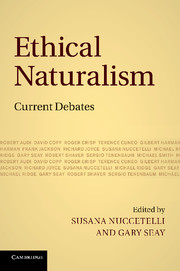Book contents
- Frontmatter
- Contents
- Contributors
- Introduction
- Chapter 1 Naturalism in moral philosophy
- Chapter 2 Normativity and reasons: five arguments from Parfit against normative naturalism
- Chapter 3 Naturalism: feel the width
- Chapter 4 On ethical naturalism and the philosophy of language
- Chapter 5 Metaethical pluralism: how both moral naturalism and moral skepticism may be permissible positions
- Chapter 6 Moral naturalism and categorical reasons
- Chapter 7 Does analytical moral naturalism rest on a mistake?
- Chapter 8 Supervenience and the nature of normativity
- Chapter 9 Can normativity be naturalized?
- Chapter 10 Ethical non-naturalism and experimental philosophy
- Chapter 11 Externalism, motivation, and moral knowledge
- Chapter 12 Naturalism, absolutism, relativism
- Bibliography
- Index
Chapter 6 - Moral naturalism and categorical reasons
Published online by Cambridge University Press: 05 January 2012
- Frontmatter
- Contents
- Contributors
- Introduction
- Chapter 1 Naturalism in moral philosophy
- Chapter 2 Normativity and reasons: five arguments from Parfit against normative naturalism
- Chapter 3 Naturalism: feel the width
- Chapter 4 On ethical naturalism and the philosophy of language
- Chapter 5 Metaethical pluralism: how both moral naturalism and moral skepticism may be permissible positions
- Chapter 6 Moral naturalism and categorical reasons
- Chapter 7 Does analytical moral naturalism rest on a mistake?
- Chapter 8 Supervenience and the nature of normativity
- Chapter 9 Can normativity be naturalized?
- Chapter 10 Ethical non-naturalism and experimental philosophy
- Chapter 11 Externalism, motivation, and moral knowledge
- Chapter 12 Naturalism, absolutism, relativism
- Bibliography
- Index
Summary
Suppose you recognize that lying to your spouse simply to save face is wrong. Under what conditions does the wrongness of this act provide you with a reason not to lie? Proponents of the Humean theory of reasons answer that it does so only when and because you have desires of the right sorts. According to the Humean view, the fact that your lying is wrong does not, as such, provide you with a reason to act; it does so only because you also care about such things as doing what is right or the wellbeing of those who might be adversely affected by your lying, such as your spouse. If you were to lack desires such as these, however, you would also lack a reason not to lie. To which Humeans typically add: most of us do in fact have such desires and, hence, such reasons. There is a reliable contingent connection between an act’s being wrong and our having a reason not to perform it.
Philosophers who identify themselves as both moral realists and naturalists tend to embrace the Humean theory of reasons. These philosophers offer arguments of various sorts for their position. Philippa Foot, for example, argues that accepting Humeanism saves realists from believing the Kantian “illusion” that all failures of morality are also failures of rationality. Mark Schroeder argues, by contrast, that since the Humean theory provides the most streamlined account of the conditions under which we have reasons to act, it should be accepted. Peter Railton contends, somewhat differently, that “for all its faults,” the Humean theory “is the clearest notion we have of what it is for an agent to have reasons to act.” None of these philosophers, it should be noted, argues that there is something specific about a naturalist approach to philosophy that recommends Humeanism. Still, they all believe that their position is better off because it embraces the Humean theory. A commitment to the Humean theory, say these philosophers, is a virtue of their view.
- Type
- Chapter
- Information
- Ethical NaturalismCurrent Debates, pp. 110 - 130Publisher: Cambridge University PressPrint publication year: 2011
- 1
- Cited by

